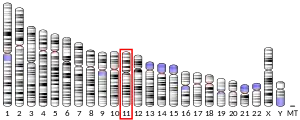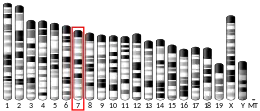IPO7
Importin-7 is a protein that in humans is encoded by the IPO7 gene.[5][6]
| IPO7 | |||||||||||||||||||||||||||||||||||||||||||||||||||
|---|---|---|---|---|---|---|---|---|---|---|---|---|---|---|---|---|---|---|---|---|---|---|---|---|---|---|---|---|---|---|---|---|---|---|---|---|---|---|---|---|---|---|---|---|---|---|---|---|---|---|---|
| Identifiers | |||||||||||||||||||||||||||||||||||||||||||||||||||
| Aliases | IPO7, Imp7, RANBP7, importin 7 | ||||||||||||||||||||||||||||||||||||||||||||||||||
| External IDs | OMIM: 605586 MGI: 2152414 HomoloGene: 4659 GeneCards: IPO7 | ||||||||||||||||||||||||||||||||||||||||||||||||||
| |||||||||||||||||||||||||||||||||||||||||||||||||||
| |||||||||||||||||||||||||||||||||||||||||||||||||||
| |||||||||||||||||||||||||||||||||||||||||||||||||||
| |||||||||||||||||||||||||||||||||||||||||||||||||||
| |||||||||||||||||||||||||||||||||||||||||||||||||||
| Wikidata | |||||||||||||||||||||||||||||||||||||||||||||||||||
| |||||||||||||||||||||||||||||||||||||||||||||||||||
The importin-alpha/beta complex and the GTPase Ran mediate nuclear import of proteins with a classical nuclear localization signal. The protein encoded by this gene is a member of a class of approximately 20 potential Ran targets that share a sequence motif related to the Ran-binding site of importin-beta. Similar to importin-beta, this protein prevents the activation of Ran's GTPase by RanGAP1 and inhibits nucleotide exchange on RanGTP, and also binds directly to nuclear pore complexes where it competes for binding sites with importin-beta and transportin. This protein has a Ran-dependent transport cycle and it can cross the nuclear envelope rapidly and in both directions. At least four importin beta-like transport receptors, namely importin beta itself, transportin, RanBP5 and RanBP7, directly bind and import ribosomal proteins.[6]
References
- GRCh38: Ensembl release 89: ENSG00000205339 - Ensembl, May 2017
- GRCm38: Ensembl release 89: ENSMUSG00000066232 - Ensembl, May 2017
- "Human PubMed Reference:". National Center for Biotechnology Information, U.S. National Library of Medicine.
- "Mouse PubMed Reference:". National Center for Biotechnology Information, U.S. National Library of Medicine.
- Gorlich D, Dabrowski M, Bischoff FR, Kutay U, Bork P, Hartmann E, Prehn S, Izaurralde E (Aug 1997). "A novel class of RanGTP binding proteins". J Cell Biol. 138 (1): 65–80. doi:10.1083/jcb.138.1.65. PMC 2139951. PMID 9214382.
- "Entrez Gene: IPO7 importin 7".
Further reading
- Jäkel S, Görlich D (1998). "Importin beta, transportin, RanBP5 and RanBP7 mediate nuclear import of ribosomal proteins in mammalian cells". EMBO J. 17 (15): 4491–4502. doi:10.1093/emboj/17.15.4491. PMC 1170780. PMID 9687515.
- Paraskeva E, Izaurralde E, Bischoff FR, et al. (1999). "CRM1-mediated recycling of snurportin 1 to the cytoplasm". J. Cell Biol. 145 (2): 255–264. doi:10.1083/jcb.145.2.255. PMC 2133107. PMID 10209022.
- Jäkel S, Albig W, Kutay U, et al. (1999). "The importin beta/importin 7 heterodimer is a functional nuclear import receptor for histone H1". EMBO J. 18 (9): 2411–2423. doi:10.1093/emboj/18.9.2411. PMC 1171324. PMID 10228156.
- Dean KA, von Ahsen O, Görlich D, Fried HM (2001). "Signal recognition particle protein 19 is imported into the nucleus by importin 8 (RanBP8) and transportin". J. Cell Sci. 114 (Pt 19): 3479–85. doi:10.1242/jcs.114.19.3479. PMID 11682607.
- Bäuerle M, Doenecke D, Albig W (2002). "The requirement of H1 histones for a heterodimeric nuclear import receptor". J. Biol. Chem. 277 (36): 32480–32489. doi:10.1074/jbc.M202765200. PMID 12080050.
- Strausberg RL, Feingold EA, Grouse LH, et al. (2003). "Generation and initial analysis of more than 15,000 full-length human and mouse cDNA sequences". Proc. Natl. Acad. Sci. U.S.A. 99 (26): 16899–16903. Bibcode:2002PNAS...9916899M. doi:10.1073/pnas.242603899. PMC 139241. PMID 12477932.
- Gevaert K, Goethals M, Martens L, et al. (2004). "Exploring proteomes and analyzing protein processing by mass spectrometric identification of sorted N-terminal peptides". Nat. Biotechnol. 21 (5): 566–569. doi:10.1038/nbt810. PMID 12665801. S2CID 23783563.
- Fassati A, Görlich D, Harrison I, et al. (2003). "Nuclear import of HIV-1 intracellular reverse transcription complexes is mediated by importin 7". EMBO J. 22 (14): 3675–3685. doi:10.1093/emboj/cdg357. PMC 165627. PMID 12853482.
- Bouwmeester T, Bauch A, Ruffner H, et al. (2004). "A physical and functional map of the human TNF-alpha/NF-kappa B signal transduction pathway". Nat. Cell Biol. 6 (2): 97–105. doi:10.1038/ncb1086. PMID 14743216. S2CID 11683986.
- King FW, Shtivelman E (2004). "Inhibition of nuclear import by the proapoptotic protein CC3". Mol. Cell. Biol. 24 (16): 7091–7101. doi:10.1128/MCB.24.16.7091-7101.2004. PMC 479715. PMID 15282309.
- Gerhard DS, Wagner L, Feingold EA, et al. (2004). "The status, quality, and expansion of the NIH full-length cDNA project: the Mammalian Gene Collection (MGC)". Genome Res. 14 (10B): 2121–2127. doi:10.1101/gr.2596504. PMC 528928. PMID 15489334.
- Rush J, Moritz A, Lee KA, et al. (2005). "Immunoaffinity profiling of tyrosine phosphorylation in cancer cells". Nat. Biotechnol. 23 (1): 94–101. doi:10.1038/nbt1046. PMID 15592455. S2CID 7200157.
- Kahle J, Baake M, Doenecke D, Albig W (2005). "Subunits of the heterotrimeric transcription factor NF-Y are imported into the nucleus by distinct pathways involving importin beta and importin 13". Mol. Cell. Biol. 25 (13): 5339–5354. doi:10.1128/MCB.25.13.5339-5354.2005. PMC 1157003. PMID 15964792.
- Arnold M, Nath A, Hauber J, Kehlenbach RH (2006). "Multiple importins function as nuclear transport receptors for the Rev protein of human immunodeficiency virus type 1". J. Biol. Chem. 281 (30): 20883–20890. doi:10.1074/jbc.M602189200. PMID 16704975.
- Zaitseva L, Myers R, Fassati A (2007). "tRNAs promote nuclear import of HIV-1 intracellular reverse transcription complexes". PLOS Biol. 4 (10): e332. doi:10.1371/journal.pbio.0040332. PMC 1584419. PMID 17020411.
- Saijou E, Itoh T, Kim KW, et al. (2007). "Nucleocytoplasmic shuttling of the zinc finger protein EZI Is mediated by importin-7-dependent nuclear import and CRM1-independent export mechanisms". J. Biol. Chem. 282 (44): 32327–32337. doi:10.1074/jbc.M706793200. PMID 17848547.



